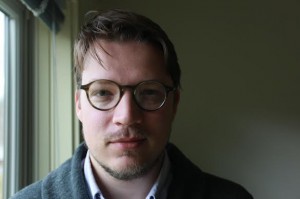Nobody
after Mark Levine
Yesterday was nobody’s favorite day, but it’s almost over.
Nobody was dancing naked on a truck idling in a driveway.
Nobody was dancing with a woman who wasn’t there.
Nobody was claiming his life was just a metaphor
for founding a town. Nobody was knocking back whiskey.
Nobody lacked remorse.
And on an old highway, macadam, long decommissioned,
that used to host caravans of families going to church,
I ran into a boy who swore to me
he was my son. I kissed him on the head, told him,
“Don’t run off like that.”
“This is the saddest moment of my life,” I said.
“This is the saddest moment of nobody’s life,” he said.
And as we pushed aside a tangle of leaves to enter
a stolen wood, we knew we’d be joined
by no one not dragging their fat bags behind them.
And the poplars began to shake, or we did.
And the leaves reflected light as they twisted
in the dumb wind—a school of fish
shot through by sun—and nobody was bothered
by a reality that had already come, and nobody
was longing for the one that hadn’t.
Learning to Pray Again
The barn was empty for a long time before this.
No reason for me to be here in the hay,
under the sum of dust loosed
from the rafters. What use is this camera,
this cracked lens? I want to light
an oil lantern that won’t light. In these times,
I need to write my name somewhere—
on my leg, on a sign. You start to sing.
Your voice carrying from the house.
The words familiar, though I cannot make out the words.
Your voice a field, though there are animals in the field.
A rain begins in the leaves and ends in the leaves.
A dog runs barking from the yard. I try to sing with you
but cannot sing with you. Every removal can be endured.
The Mistake
You and I have likely a very different understanding of why
We’ve made the mistake of coming here, of journeying
All this way, by which I mean peering through the window of this one-room cabin
Called now or earth or love, just to sprawl our tired limbs
On a stranger’s disturbingly beige carpet.
Nevertheless, I often find myself
Wondering about the not-so-innocent lives of oil paintings,
The awfully blue horses kneeling in their shade,
The way their impossible green goes on living, never standing a chance
Of learning how awkwardly similar they are
To us, slouched in an enormous
Wicker chair, where a vase clutching an orchid
Has just spilt onto a miniature table unfolded in front of us.
And I forget us, as this snow is forgetting this street lamp,
These power lines, as these unsuspecting farmers rust in their fields
And never know they were part of something too important to see,
A part of time, which is a part of me, a form
Of struggle, itself
Becoming struggle, ending in the courage to surrender
To a will remarkably not one’s own, a shock of crows lifting
From the hand of a tree, or a tree lifting from the hand of no one you know.
biography

Born in the Adirondacks, JUSTIN BOENING is the author of Self-Portrait as Missing Person, winner of a Poetry Society of America’s National Chapbook Fellowship. His poetry, reviews, and interviews have appeared in a variety of literary journals such as Boston Review, Colorado Review, Lana Turner, and Poetry Northwest, where he’s an associate editor. A graduate of Columbia University’s School of the Arts, Boening currently lives in Lewisburg, PA where he works at Bucknell University as a Stadler Fellow in Poetry.